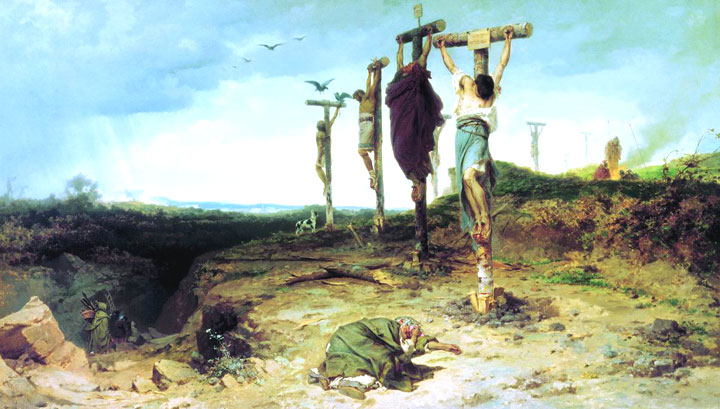by Andy Chalkley
Jesus was preaching love and kindness. I often explain what Jesus was trying to tell us with these simplified sentences. “You are doing things wrong. You need to start being good to each other.” He was preaching loving kindness but he was also preaching justice — Justice of all types. Teaching kindness and forgiveness would not be likely to upset authorities or those with power and influence. Teaching justice implies fault on the part of local religious leaders and on the Roman leaders and any other persons with power. He upset the 1% of the time. He was a threat to the continuance of power by the controlling elites, whether they were controlling by legal force through a court system, an illegal force with thuggery or by debt and usury.
The Romans used crucifixion for pirates, troublesome slaves and enemies of the state. Logic says that Jesus would have been crucified for being an enemy of the state as he was neither a pirate or troublesome slave. Pilot would not have crucified him for preaching peace and kindness, so it would have been for preaching about justice. The execution was probably encouraged by the local leaders who may have been religious leaders or leaders by money and debt. This was possibly supported by an angry crowd which may have been a “rent a crowd”. The local ruling elites would be pleased to see him go because Jesus objected to the manipulation of money and was thus a threat to their income and control.
Society was becoming corrupted. Some were getting very rich but the peasants were suffering in poverty. The story of driving the money changers from the temple is either one single event or it is one of his regular preaching themes. So references to money changers would be a reference to the manipulation of money which would have been usury. Usury is the practice of lending some monetary unit in a manner that there is not enough money to repay the loan. This of course then creates unpayable debt and dispossession of assets. So I argue that it was a usury and the objection to usury that encouraged the creditor class of his time to encourage the pilot to kill him. When Jesus threatened to stop usury and thus the income of the creditor class, he would have become a prime candidate for the affluent creditor class to recommend for crucifixion.
I suggest you do a websearch on “why was jesus crucified”
Further Reading:
http://www.gospel-mysteries.net/crucifixion-jesus.html
http://www.huffingtonpost.com/matt-j-rossano/why-was-jesus-crucified_b_842509.html
[References include: http://www.gospel-mysteries.net/crucifixion-jesus.html http://www.huffingtonpost.com/matt-j-rossano/why-was-jesus-crucified_b_842509.html]
The Peaceful Revolution Network
xat.com words the issue in this manner under the title:
Jesus Flips (many coins) 33 A.D.
“Jesus was so upset by the sight of the money changers in the temple, he waded in and started to tip over the tables and drive them out with a whip, this being the one and only time we ever hear of him using force during his entire ministry.
So what caused the ultimate pacifist to become so aggressive?
For a long time, the Jews had been called upon to pay their temple tax with a special coin called the half shekel. It was a measured half ounce of pure silver with no image of a pagan emperor on it.
It was to them the only coin acceptable to God.
But because there was only a limited number of these coins in circulation, the money changers were in a buyers market and like with anything else in short supply, they were able to raise the price to what the market would bear.
They made huge profits with their monopoly on these coins and turned this time of devotion into a mockery for profit. Jesus saw this as stealing from the people and proclaimed the whole setup to be. “A den of thieves”.
Once money is accepted as a form of exchange, those who produce, loan out and manipulate the quantity of money are obviously in a very strong position. They are the ‘Money Changers’.”
[http://www.xat.org/xat/moneyhistory.html]
To say that Jesus died for our sins appears to be a distortion used by the organizers of the Christian faith which has the effect of making us feel guilty. Jesus did not preach guilt nor does it make sense to say the Romans nailed him so a scaffold to pay for the sins of those yet born. And the term ‘Christian’ did not even exist at the time.
Jesus was a revolutionary who preached kindness and preached against oppression and injustice. Jesus was trying to make a change in a society that has gone astray. Jesus made a huge statement when he tipped over the tables of the moneylenders in the church/synagogue. He threatened the monopoly of the moneylenders which was clearly supported by the religious leaders. The religious leaders and the money changers would certainly be out to neutralise him because of his revolutionary ideas. More than anything, Jesus was a threat to the continuance of the extortionate profits they were receiving from usury and the monopolisation of the silver half shekel. Jesus had to go, to protect their usury.
Emperor Constantine
Years later Emperor Constantine instituted debt-free money spent into society. Constantine also made Christianity the main religion of the Roman Empire. One common story was that he made Christianity the main religion of the Roman Empire because Christians believed in heaven and so made better warriors as they did not fear death if fighting for a good cause. The debt-free money was spent into society on public works and enabled a massive reduction in debt and enabled a reduction of extortion by usury.
One has to remember that the Bible was written after the death of Jesus. So it has things like “Render under Caesar that which is Caesar’s” which implies obedience to your rulers whereas Jesus stood up against injustice by rulers. Jesus was possibly an anarchist but he was certainly a rebel. Usury, with its poverty creating injustices, would have been pretty high on the list of institutionalized injustice that Jesus preached against. The message put out by the Occupy movement is closer to the message of Jesus than the message of the current Christian church.
‘Jesus Hates Usury’
“Jesus took on the ‘money lenders’ who were the most powerful entity on the planet then and today.”
“Jesus rebelled against the Banksters who were perpetrating the Sin of usury which is forbidden by the law of Moses.”
[http://starthere.the11thcommandment.org Accessed 2015-03-31]
‘Jesus Hates Usury’
“Christ was tortured and crucified by Mammon as revenge for His anti-usury and Jubilee activism. Christ started a rebellion against the Banksters which later made usury forbidden by the Church for 1500 years. This is why Mammon finances an ongoing war against Christianity today. Do you want to peacefully, fight back? Here’s how we do it.”
[Jesus Hates Usury. Pastors’ Peaceful Revolt. http://starthere.the11thcommandment.org/pastors-revolt Retrieved 2015-04-21]
Richard Posner 2014
“This cadre of bankers, investors and financiers are the modern equivalent of the money changers that the legendary Jesus allegedly drove from the temple.”
Richard Posner 2014: The Gold Myth and Commodity Money: Ancient Scams of Historical Proportions







